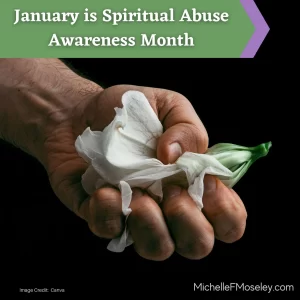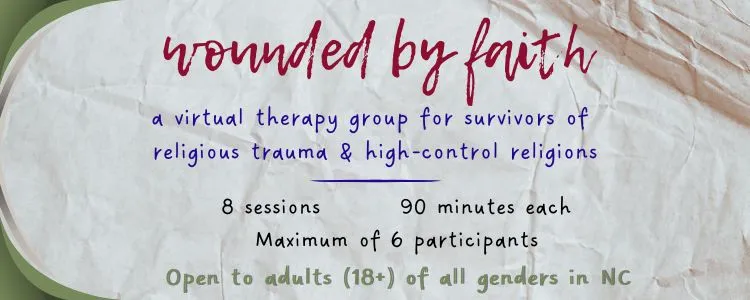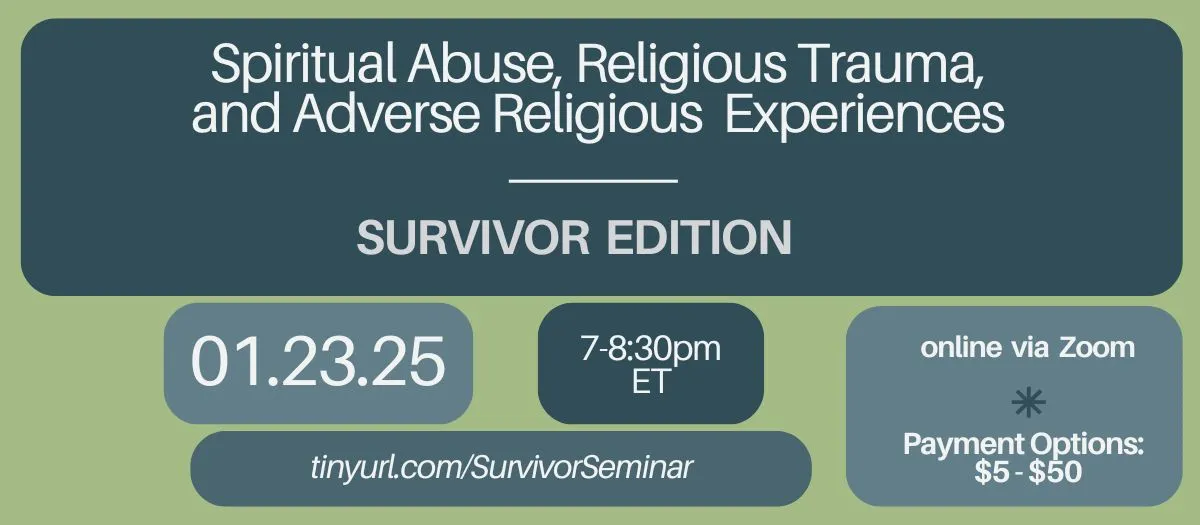January is Spiritual Abuse Awareness Month. I first became aware of this term around 2015, but the first use of “spiritual abuse” as a term with a distinct definition dates back to the early 1990s.
I tend to find that people are either quite familiar with the concept of spiritual abuse, often even having their own experience, or they have never heard the term and may even question its validity. I hope this post provides something helpful for folks who fit either of those descriptions, as well as anyone else who may be reading.

What Is Spiritual Abuse?
Spiritual abuse is the conscious or unconscious use of power to direct, control, or manipulate another person, or to influence one’s capacity for choice within a spiritual or religious context.*
This is one of the first concise definitions of spiritual abuse I personally came across, and it resonated with me. My experience of spiritual abuse includes a perpetrator who was in a role of leadership in a religious context. This person acted both consciously and unconsciously (at various times) in ways that utilized their role of power to manipulate me, situations, and others’ perceptions of what was happening.
My ability to make choices was attacked to the point that I no longer recognized having any choices. My response was what is often called “fawning” in the context of fight/flight/fear/fawn responses to traumatic events. I spent 2+ years trying to appease this individual, yet continually being told all the ways I was falling short. At that point, I had never heard the term “spiritual abuse”, but that is exactly what I was experiencing.
A FEW OTHER DEFINITIONS OF SPIRITUAL ABUSE
“Spiritual abuse is the misuse of power in a spiritual context in which a person or group uses coercive and manipulative methods of controlling the victim, resulting in the abused individual experiencing spiritual, emotional/psychological, physical, or relational harm.” (Karen Roudkovski, Understanding Spiritual Abuse)
“Spiritual abuse happens when someone uses spiritual or religious beliefs to hurt, scare, or control you. It can involve someone forcing you or your children to participate in spiritual or religious practices when you don’t want to.” (1900respect.org – Australian Violence Prevention Site)
Spiritual abuse is “a distortion and exploitation of spiritual authority to manipulate, control, use, or harm others, mostly through shame and fear.” (Rachael Clinton Chen of The Allender Center)
THINGS TO REMEMBER
Spiritual abuse:
- Can occur in organized religious settings such as churches, as well in any context where spirituality of any kind is emphasized
- Generally involves a power difference between the perpetrator and the abused
- Can be overt – more obvious and/or intentional, or covert – less obvious, possibly even unintentional
- May create a dynamic where an individual is both a victim of spiritual abuse and a perpetrator of spiritual abuse
Next Steps
What is your reaction as you’re reading through this information about spiritual abuse?
You may find yourself nodding along, recognizing that you have had an experience that fits these descriptions of spiritual abuse.
You may be left questioning the reality or prevalence of spiritual abuse. Or maybe you’re wondering how you can support survivors of spiritual abuse or help prevent it from occurring in your own church, group, or organization.
If you find that you’re resonating with these definitions of spiritual abuse, perhaps even recognizing that you have been impacted by spiritual abuse in your own life, here are a few options for you to consider in finding support:
- Individual therapy with a licensed mental health professional who understands the realities of spiritual abuse and religious trauma.
- If you’re located in NC, I would be happy to schedule a free, 15-minute virtual consultation for us to discuss if we may be a good fit for working together – simply complete this contact form.
- Outside of North Carolina? Reclamation Collective has a therapist directory filled with mental health professionals who work with survivors of spiritual abuse. The Religious Trauma Collective is also an excellent resource, and includes a practitioner directory specifically for Australia and New Zealand.
- Group Therapy can provide a space for healing and connection that meets needs differently than your individual work with a therapist. I regularly facilitate a therapy group called Wounded By Faith that is designed to provide understanding and healing from experiences such as spiritual abuse in the context of a structured group environment. Registration is currently open for the next round of the group, beginning in March 2025 – you can learn more and complete an interest form here.

- You may also find connection, understanding, and healing through various other types of online communities or support groups, including:
- Religious Harm Recovery – Megan Von Fricken, a social worker and cult survivor, offers information and support through various avenues including emails, a Facebook group, and her coaching services.
- Reclamation Collective Support Groups – These 10-week groups are open to anyone with internet access, with a focus on making this support financially accessible to folks. Each season of groups includes some that focus on specific identities to allow folks to connect in ways that provide the most possible safety for exploring tough topics.
- Black Religious Trauma Network – This resource has been created by Black religious trauma survivors and offers multiple avenues of support – podcast, Facebook group, and regular virtual gatherings – for Black people who have experienced religious trauma in the Black church.
For anyone who may find themselves questioning or wanting to learn more about spiritual abuse, I invite you to attend the informational webinar I will be providing later this month:
- For SURVIVORS of spiritual abuse (or those who may be unsure if their experience was/is spiritual abuse) – Join me and other survivors (or questioners) for a virtual informational webinar on January 23, 2025 at 7pm ET. I’ll be sharing some information that may help you better understand your experience, as well as some resources for further exploration. I’ll also be answering questions submitted by those who register to attend. You can learn more and register here.

Please stay tuned, as I will be sharing more on the topic of spiritual abuse both here and on social media throughout the month of January.
*I want to express my gratitude for the work of Marlene Winell, Reclamation Collective, Religious Trauma Institute, Center for Trauma Recovery and Resolution, Karen Roudkavski, Kathryn Keller, and Craig Cashwell, Ph.D in crafting and sharing vocabulary and definitions to assist folks in discussing topics related to spiritual abuse.
**This post is an update of a blog originally posted on January 2, 2024.**
Michelle F. Moseley is a Licensed Clinical Mental Health Counselor in NC. She believes ALL people deserve respect, compassion, and access to mental and physical healthcare. Michelle specializes in working with survivors of religious trauma, and with those who have body image concerns, finding there is frequent overlap in these areas. She also frequently supports late-identified neurodivergent individuals as they navigate the grief and relief of a new understanding of self. You can learn more about Michelle by visiting her website at MichelleFMoseley.com or following her on Instagram – @therapy_with_michelle
Sign-up for Michelle’s Monthly Email Newsletter to make sure you never miss a blog post
